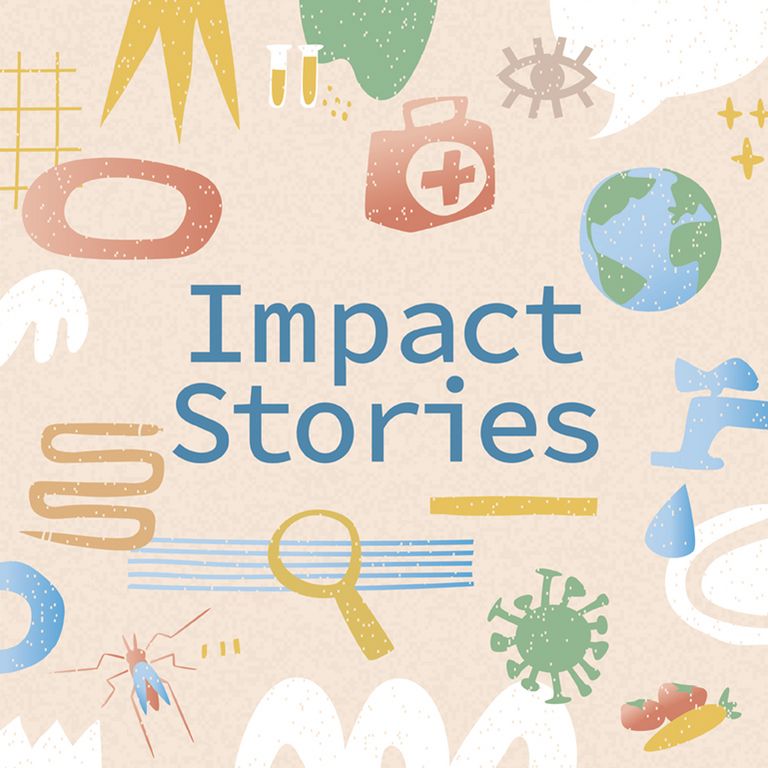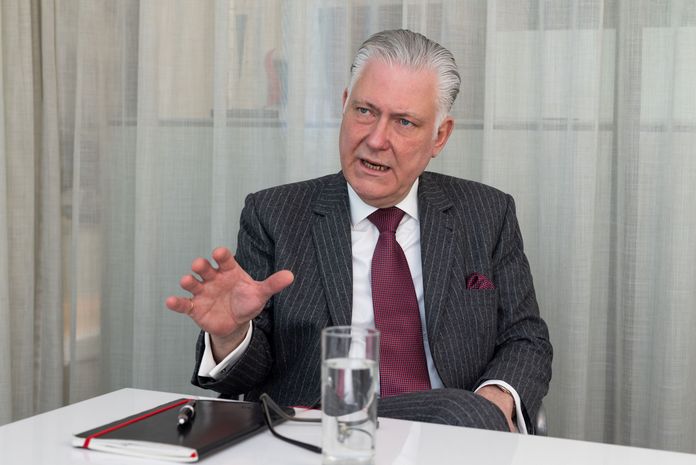


Lutz Hegemann, President of Global Health & Sustainability at Novartis, has been a member of the Board of Governors of Swiss TPH since 2023. In this interview, he tells us why he moved from being a doctor to the pharmaceutical industry, how public-private partnerships can be successful in tackling neglected diseases, and how public health priorities need to change in the face of climate change.
You started your career as a public health physician and scientist. What motivated you to move to the private sector?
Lutz Hegemann: “I thoroughly enjoyed working as a physician. The difference is that as a doctor I had an impact on the life of an individual patient, whereas in the private sector one can have an impact on the lives of an entire population. My first experience in public health was in India in the late 1980s, treating patients with leprosy. At that time, it became possible to treat this stigmatising disease with a drug developed by a predecessor company of Novartis. Seeing that a patient could be treated, and the disease burden of a population could be reduced, left a lasting impression.”
At Novartis, you are President of Global Health & Sustainability. What is the focus of your team?
Lutz Hegemann: “Our aim is to make our pharmaceutical innovations accessible to as many patients as possible. In global health, we focus on neglected patients, neglected diseases, and neglected countries that are not economically attractive and therefore not part of our profit-orientated core business. We have our own research centre for tropical diseases in California, conduct clinical development and bring medicines to market in low- and middle-income countries. We work on diseases such as malaria, leishmaniasis and dengue fever, which primarily affect poorer countries and marginalised communities.”
You have been a member of the Board of Governors of Swiss TPH for over a year. What are your impressions and how can you bring in your experience?
Lutz Hegemann: “At Novartis, we have been working with Swiss TPH for many years in the development, implementation and evaluation of health programmes. It’s therefore an honour and a pleasure to be part of the Board of Governors and to contribute my experience. The Board is very committed, collaborative and brings together many different perspectives. I’d like to bring my experience of setting up and running large global health programmes. I also want to bring in the perspectives of the private sector and of low- and middle-income countries, guided by my deep understanding from working in and serving these communities for more than two decades. It is my firm belief that pharmaceutical companies can do a lot more than just providing medicines – we can work actively in partnerships with public and private organisations to build better health systems.”
"Partnerships between research institutes, political institutions, local healthcare providers and the private sector can be very fruitful."
What is the importance of global partnerships in research and development (R&D)? How do they work? What is the motivation behind having these partnerships for Novartis and what challenges do you see?
Lutz Hegemann: “The challenges of our time can’t be tackled by individual countries, sectors or organisations. They can only be addressed through multi-sector partnership. You need a shared vision of what you want to achieve, and you need the complementary skills and experience of different partners. Partnerships between, for example, research institutes, political institutions in a country, local healthcare providers and the private sector can be very fruitful. They are not always easy to establish, but they are the only way to create sustainable impact. Successful partnerships require the motivation and commitment of all partners to contribute their resources and unique expertise.”
Leprosy is a neglected tropical disease. How can partnerships between the pharmaceutical industry and organisations like Swiss TPH contribute to addressing the challenges associated with leprosy treatment and elimination?
Lutz Hegemann: “Many people today are surprised that leprosy still exists. Because of my past experience with leprosy patients, the fight against the disease is close to my heart. The global prevalence of leprosy has been reduced by more than 95% in the last four decades since the introduction of multidrug therapy (MDT) and we have now reached a plateau. The challenge is to go the last mile and eliminate the disease. We know how to diagnose leprosy, we have efficacious treatments, but we need to reach the remaining patients who often live in remote places. Together with Swiss TPH and partners in Tanzania, we are planning an implementation study with the aim of treating patients as early as possible to prevent the development of irreversible deformities, and prophylactically treating contacts of leprosy patients in their environment to interrupt transmission. I have high hopes for this collaboration.”
"The impact of climate change on global health is clear to see as such diseases continue to spread beyond traditional tropical and sub-tropical regions."
Looking ahead, what do you envision as key priorities and opportunities for the new 4-year-strategy of Swiss TPH 2025 – 2028?
Lutz Hegemann: “The changing environment must be reflected in public health priorities. Warming temperatures, extreme weather, and poor air quality are rapidly changing the patterns of diseases, making human health the face of climate change. Whether dengue-carrying mosquitoes in the Parisian suburbs or leishmania-infected sandflies in the southern states of the USA, the impact of climate change on global health is clear to see as such diseases continue to spread beyond traditional tropical and sub-tropical regions. Changes in climate, migration, urbanisation, ageing or mental health are macro-trends that affect health and are already reflected in many Swiss TPH projects. Swiss TPH can play an even more important role in providing data and showing other organisations how to address these global challenges.”
Do you have an example?
Lutz Hegemann: “One example is the development of new medicines. We can’t tackle tomorrow’s challenges with the tools of yesterday. In malaria, where there hasn’t been a new medicine in 25 years, drug resistance is on the rise. Novartis, together with Swiss TPH, will now start a phase III clinical trial of a new antimalarial. We need to remain focused on these neglected diseases and advocate for investment in the areas of research and development.”
What has been the most rewarding experience in your work related to improving access to healthcare, particularly in resource-constrained settings?
Lutz Hegemann: “You can’t solve global health challenges from an air-conditioned office in Basel. Spending time and being in touch with patients and our partners in these countries is important to me because you can really see the impact we are creating for these communities. The success we have achieved as a global community in leprosy, or the fact that malaria has been brought under control in large parts of the world, are changes that give me great hope after more than 25 years working in this field. But ultimately, it is not the numbers that count, but the people behind those numbers.”